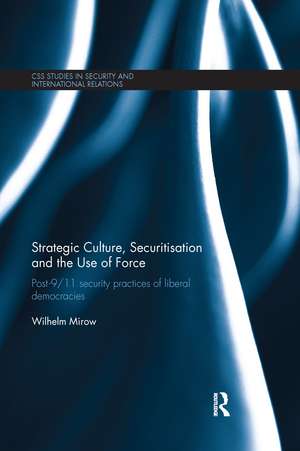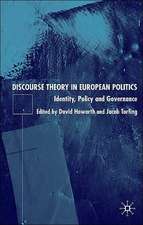Strategic Culture, Securitisation and the Use of Force: Post-9/11 Security Practices of Liberal Democracies: CSS Studies in Security and International Relations
Autor Wilhelm Mirowen Limba Engleză Paperback – 30 iun 2020
The responses of democratic states throughout the world to the September 2001 terrorist attacks have varied greatly. This book analyses the various factors that had an impact on decisions on the use of force by governments of liberal democratic states. It seeks to explain differences in the security policies and practices of Australia, Canada, France, Germany and the UK regarding the war in Afghanistan, domestic counterterrorism measures and the Iraq War. To this end, the book combines the concepts of strategic culture and securitisation into a theoretical model that disentangles the individual structural and agential causes of the use of force by the state and sequentially analyses the impact of each causal component on the other. It argues that the norms of a strategic culture shape securitisation processes of different expressions, which then bring about distinct modes of the use of force in individual security policy decisions. While governments can also deviate from the constraints of a strategic culture, this is likely to encounter a strong reaction from large parts of the population which in turn can lead to a long-term change in strategic culture.
This book will be of much interest to students of strategic culture, securitisation, European politics, security studies and IR in general.
| Toate formatele și edițiile | Preț | Express |
|---|---|---|
| Paperback (1) | 259.98 lei 6-8 săpt. | |
| Taylor & Francis – 30 iun 2020 | 259.98 lei 6-8 săpt. | |
| Hardback (1) | 1165.20 lei 6-8 săpt. | |
| Taylor & Francis – 15 apr 2016 | 1165.20 lei 6-8 săpt. |
Din seria CSS Studies in Security and International Relations
- 18%
 Preț: 1054.71 lei
Preț: 1054.71 lei -
 Preț: 445.56 lei
Preț: 445.56 lei -
 Preț: 413.55 lei
Preț: 413.55 lei -
 Preț: 430.94 lei
Preț: 430.94 lei - 12%
 Preț: 352.21 lei
Preț: 352.21 lei -
 Preț: 416.96 lei
Preț: 416.96 lei -
 Preț: 484.35 lei
Preț: 484.35 lei -
 Preț: 386.51 lei
Preț: 386.51 lei - 13%
 Preț: 295.25 lei
Preț: 295.25 lei -
 Preț: 447.51 lei
Preț: 447.51 lei -
 Preț: 414.32 lei
Preț: 414.32 lei -
 Preț: 279.72 lei
Preț: 279.72 lei - 12%
 Preț: 299.52 lei
Preț: 299.52 lei - 16%
 Preț: 262.14 lei
Preț: 262.14 lei - 18%
 Preț: 836.89 lei
Preț: 836.89 lei -
 Preț: 490.50 lei
Preț: 490.50 lei - 17%
 Preț: 259.98 lei
Preț: 259.98 lei
Preț: 259.98 lei
Preț vechi: 311.41 lei
-17% Nou
Puncte Express: 390
Preț estimativ în valută:
49.76€ • 51.75$ • 41.70£
49.76€ • 51.75$ • 41.70£
Carte tipărită la comandă
Livrare economică 14-28 martie
Preluare comenzi: 021 569.72.76
Specificații
ISBN-13: 9780367596828
ISBN-10: 0367596822
Pagini: 266
Dimensiuni: 156 x 234 mm
Greutate: 0.45 kg
Ediția:1
Editura: Taylor & Francis
Colecția Routledge
Seria CSS Studies in Security and International Relations
Locul publicării:Oxford, United Kingdom
ISBN-10: 0367596822
Pagini: 266
Dimensiuni: 156 x 234 mm
Greutate: 0.45 kg
Ediția:1
Editura: Taylor & Francis
Colecția Routledge
Seria CSS Studies in Security and International Relations
Locul publicării:Oxford, United Kingdom
Public țintă
Postgraduate, Professional, and UndergraduateCuprins
Introduction PART I: A COMPREHENSIVE MODEL OF THE USE OF FORCE BY THE STATE 1. Ontology and causation in International Relations 2. The theoretical model incorporating strategic culture and securitisation 3. Operationalising the Theoretical Model PART II: COMPARING STRATEGIC CULTURES 4. Formative Moments, Founding Narratives and Identity Conceptions 5. Comparative Cross-country Analysis PART III: COMPARING DECISION PROCESSES ON THE USE OF FORCE 6. Analysing British Decision Processes on the Use of Force 7. Analysing German Decision processes on the Use of Force 8. Analysing French Decisions on the Use of Force 9. Analysing Australian Decisions on the Use of Force 10. Analysing Canadian Decisions on the Use of Force Conclusion
Notă biografică
Wilhlem Mirow has a PhD in International Relations, Center for Security Studies (CSS), Swiss Federal Institute of Technology (ETH) Zurich.
Descriere
This book proposes a new theoretical framework which combines the concept of strategic culture with the concept of securitisation, to show how this interaction impacts on democratic nations' decisions to use force.


















